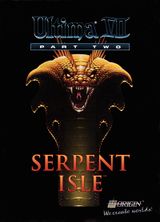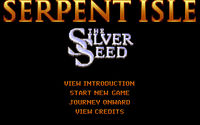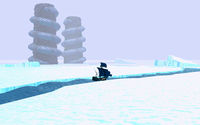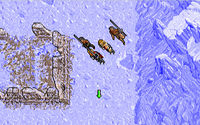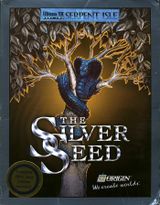Ultima VII Part Two: Serpent Isle
Ultima VII Part Two: Serpent Isle is the eighth installment of the main series and the twelfth in the entire series, counting the Worlds of Ultima, Ultima Underworld and Ultima Underworld II. It was released and published by Origin for the IBM PC in 1993. It is part of the "Age of Armageddon" saga.
Gameplay[edit]
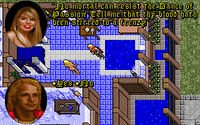
The story and world of Ultima VII Part Two are quite different from Ultima VII. Compared to its predecessor, Serpent Isle is much more linear and is built around scripted scenes – the player is obstructed from visiting various parts of the world at the beginning. The plot is also very different, being set away from Sosaria/Britannia for the first time since Ultima II. The story is very complex and has many layers, forming a huge epic of love, hate, war, peace, balance and imbalance. The game had some cuts in the story because of a deadline issued by Electronic Arts.
The Story[edit]
Spoiler warning: Plot and/or ending details follow.
Half a year after the events of Ultima Underworld II, a scroll is discovered where the Guardian sends Batlin to the Serpent Isle to catch up with Gwenno. There he would further outline plans to destroy Britannia. The Avatar, together with Iolo, Shamino and Dupre, follow Batlin through the Serpent Pillars to stop him.
The land in which they arrive is not very friendly. Formerly one of the continents of old Sosaria, the original inhabitants had destroyed themselves in an apocalyptic world war. Later settled by people who had left Britannia due to having something against the path of Virtue set by Lord British, the inhabitants are either corrupt, self-serving or shallow in their beliefs and little help on the quest. Also, mysterious teleport storms are playing havoc on the land and an order of monks is seeing this as signs of the end of the world. The connection with Batlin is uncertain. Mastering many hardships, the Avatar finally catches up with Batlin in Spinebreaker, who in turn wants to use three powerful spirits to betray the Guardian so that he could become immensely powerful. In the end, this ambition costs him his life when the Guardian withdraws his protection and he gets killed. In an apocalyptic holocaust, the three Banes of Chaos, possessing the Companions, slaughter nearly all of the inhabitants of the Serpent Isle. In the end the Avatar has to stop the Imbalance from destroying many worlds, including Britannia, by reuniting the three magical serpents of Chaos, Order and Balance. Dupre sacrifices himself, so that this task can be done.
However, as soon as this is done and balance restored, the Guardian abducts the Avatar, to a place unknown.
Spoilers end here.
The Serpent Isle is one of the three lost continents of Sosaria. During the First Age of Darkness, it was known as "The Lands of Danger and Despair".[1]
Development[edit]
Serpent Isle uses the same engine as Ultima VII: The Black Gate, only more refined and with additions, therefore there is not much difference in the technical aspects of the two games. Since Richard Garriott had decided that no two Ultima installments should use the same engine, Serpent Isle was named “Ultima VII Part Two.”
Serpent Isle originally began development as an unrelated Worlds of Ultima type of game. It was basically a fantasy pirate story, although since this first iteration never went past preliminary design stages it was never fully decided whether or not it would have been tied to the Ultima universe. As Ultima VII was nearing completion it was then decided to turn this game into a follow-up to Ultima VII, and use its engine since it was judged stable enough.
This game was named Serpent Isle because the land it was taking place was to be in the shape of Richard Garriott's snake amulet. It kept the pirate theme of the Worlds of Ultima design, and was to focus on the opposition between Britannian magic and VoDun, a form of Voodoo magic imagined for this land. Little details are known about the plot and background of this iteration, although leaked design maps presenting cities such as Fawn, Moonshade and Grey seems to suggest that the Sosarian settlers plot-aspect was already planned at that stage.
When project director Jeff George left Origin, lead designer Bill Armintrout was then promoted to project director and Warren Spector was brought in as producer. Since most of the team felt the pirate game approach would not be workable with the Ultima VII engine, it was decided to start from scratch and create a new story with more ties to the Ultima history and Ultima VII and a new set of Virtues which were designed by lead designer Sheri Graner Ray.
Having already missed the original deadline for Christmas 1992, the game was eventually released in March 1993, but the delays in development resulted in a number of plot cuts and unfinished threads. One of the most well known is that Cantra cannot be cured of her madness (the text cannot be activated in spite of being in the usecode).
Serpent Isle was the first game exclusively produced for the PC, therefore no other official ports of the game exist.
Beta Version[edit]
An internal prototype version of the game, known as the Beta 1.07, was illegally copied and published by someone called Razor 1911 in early December of 1992, a whole four months before the release of the game. The leaker of course tried to pass it off as the final game. While this build of the game is unstable and missing a lot of things, while other things are radically different, it is from a point in development before the final third of the game was being simplified due to the time pressure put onto Origin by Electronic Arts, thus making it an interesting document on what originally was planned story-wise.
There is a good article about it on The Cutting Room Floor here.
Further info is found in this thread as well, while the Beta can be found here.
Translations[edit]
For most of the international releases, only the documentation of the game, including Beyond the Serpent Pillars, was translated. The title of the book, however, stayed in English. Translated documentation is available for the German, French, Korean and Chinese (in Taiwan) releases.
The Spanish release of Serpent Isle had the game and the documentation fully translated to Spanish, for both the floppy and the CD version. Unfortunately, as with the translation of the first part, they did not prepare the game for any common special characters. So there are no accented letters in the Spanish translation.
See also Translations of Ultima games.
Release[edit]
Serpent Isle sold quite well, and received much praise from both critics and the players.
The game was later included in several compilations:
- The Complete Ultima VII (1993 and 1994)
- Ultima Collection (1998)
In Japan, the game got included in the compilation Ultima Complete.
Included with the game[edit]
The release of Serpent Isle included these things with the game:
- The book Beyond the Serpent Pillars.
- A cloth map of Serpent Isle.
Expansions[edit]
The Silver Seed[edit]
- Main article: Ultima VII Part Two: The Silver Seed
The add-on disk, published by Origin in 1993. With it installed, a totally new quest becomes available, which can be played at any time in the game. The add-on is included with most new releases of Ultima VII Part Two.
The Xenkan Monks find a mysterious Amulet, the Amulet of Balance, which they give the Avatar. Using it on a Serpent Gate, the hero and the Companions travel to the past, into the time of the War of Imbalance. The Avatar has to find and plant the Silver Seed, to prevent the imbalance from destroying the world. Finding many fine artifacts on the way, like the Ring of Reagents and the Loriel's Gift, the Avatar succeeds in this task, thus saving the world from ultimate destruction.
Included with it is the The Silver Seed Play Guide pamphlet.
Upgrades[edit]
Ultima VII Part Two is almost impossible to run on modern computers, thanks to the Voodoo Memory Manager.
Exult[edit]
Exult is an ambitious project to create an entirely new engine to play Ultima VII Part Two in Windows. The engine includes many improvements to the original game and is arguably the best way to play.
There is a collection of fixes for Ultima VII Part Two as an Exult mod, known as the Serpent Isle Fixes.
Serpent Isle in Other Languages[edit]
- While not technically an upgrade, Serpent Isle in French represents an ambitious fan project to translate the entirety of Ultima VII Part Two into another language.
- In 2012, a group of Italian fans created a patch that translates the game and its expansion into Italian.
- Sir John did develop Ultima VII Part Two auf Deutsch, which does create a full German translation of the CD version, including The Silver Seed.
Ultima VII in Windows[edit]
Ron Windeyer (aka Gaseous Dragon) has developed a utility to run the original Ultima VII natively under Windows 95/98/ME/2000/NT/XP. See his website for more information.
DOSBox[edit]
DOSBox is possibly the best way to run the game in its original form on modern computers. It is a virtual machine that can be used to run MS-DOS software in Windows, Linux, and Mac OS X (even on PowerPC).
More Game Related Information[edit]
- For bugs in this game, see Ultima VII Part Two bugs.
- For cheating in this game, see Cheating in Ultima VII Part Two.
- For Easter eggs and real-life references in this game, see Ultima VII Part Two real-life references and Easter eggs.
- For party members, see Party Members in Ultima VII Part Two.
- For food values and food sources, see Food in Ultima VII.
- For in-game map information, see Maps in Serpent Isle.
- For information regarding the items transferred by teleport storms, see List of exchanged items.
- For detailed monster data, see Ultima VII Part Two monster data.
- For detailed equipment information, see Ultima VII Part Two weapon values and Ultima VII Part Two armour values.
- For a walkthrough, see Ultima VII Part Two walkthrough.
- For information about shields, see Serpent Isle shields.
- For the location of all keys, see Key locations in Ultima VII Part Two.
- Ultima VII Part Two SFX
Trivia[edit]
- Originally there was a longer introduction, but since it would have meant many more floppy disks, it was dropped and the current introduction created. See Original Serpent Isle introduction.
- Origin failed to obtain the source for Serpent Isle and its add-in, The Silver Seed, and it was lost. This actually proved to be one of the biggest problems during the creation of Exult (see corresponding section), as everything could not be fully analyzed from the finished game.
- This is the first main Ultima game - if one excludes the Underworld games - where dress-up paperdolls are fully implemented. In previous installments, only item slots are used.
- A competition certificate could originally be obtained after winning the game.
- The original cover art of the serpent got found and is shown below.
Gallery[edit]
External Links[edit]
- The Exult Project
- Ultima 7 in Windows
- Ultima VII: The Black Gate and Serpent Isle – Notable Ultima
- Ultima VII Serpent Isle nitpicks
- Ultima VII Part Two
- Ultima VII – on Ultima Aiera
- Serpent Isle in French
- Serpent Isle in Italian
- Ultima VII Part Two on Wikipedia
